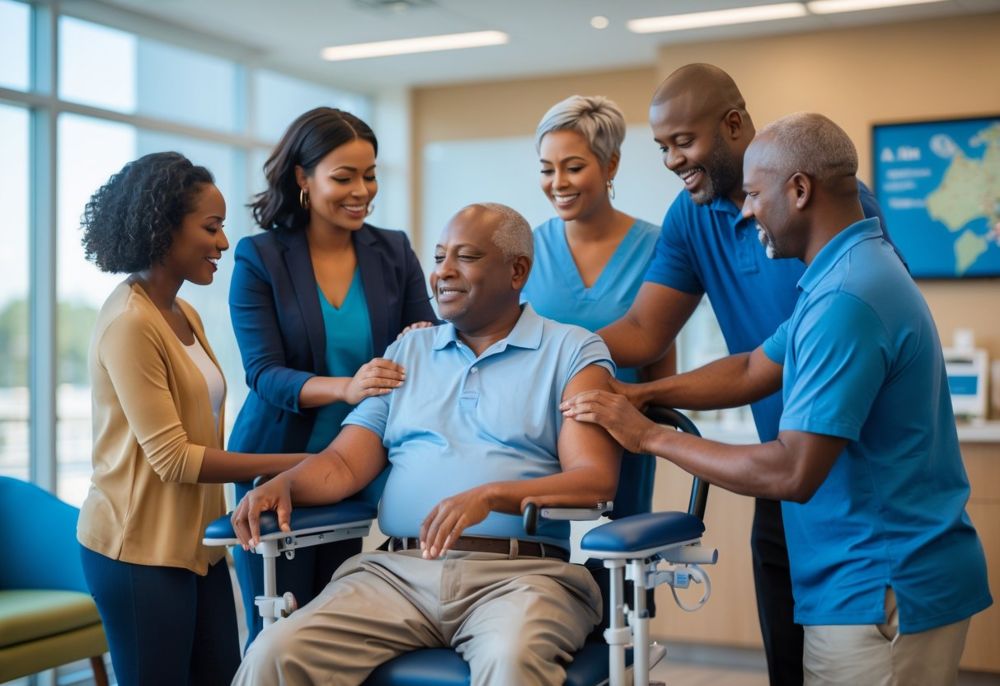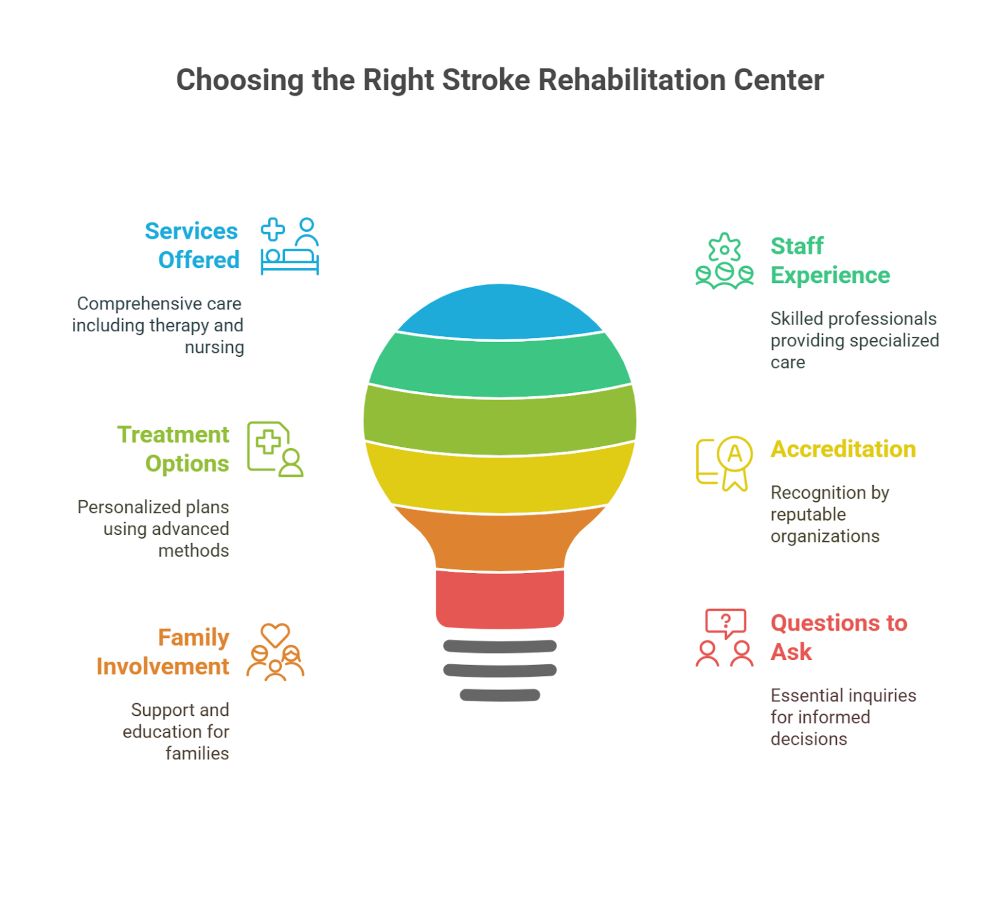Specialised Rehabilitation Services for Stroke Survivors in Atlanta: Supporting Families on the Recovery Journey
Originally published: June 2025 | Reviewed by Sadie Mays
Originally published: June 2025 | Reviewed by Sadie Mays

After a stroke, families face tough decisions about the best road to recovery.
Specialized stroke rehabilitation in Atlanta can give survivors the care, support, and therapy they need to regain skills and independence.
With numerous options available, selecting the right program can feel overwhelming.
This is especially true when searching for the most effective care.
Atlanta has several well-regarded centers and groups that focus on helping stroke survivors with their unique needs, from physical therapy to speech and occupational support.
Support groups and rehabilitation teams collaborate to guide both patients and their families through each step.
Knowing what to look for in a facility and how to access community support can improve recovery and provide relief for loved ones.

A stroke happens when blood flow to part of the brain is reduced or blocked.
This can lead to lasting brain changes, making recovery and specialized care very important for stroke survivors and their families.
A stroke interrupts the supply of blood to the brain. This can occur because a blood clot blocks a vessel (ischemic stroke) or a vessel bursts and causes bleeding (hemorrhagic stroke).
Both conditions damage brain cells quickly. When a stroke occurs, the affected brain cells start to die within minutes.
This can impact abilities like movement, speech, memory, and even how a person thinks or feels.
Some people may face muscle weakness, vision problems, memory loss, or difficulty speaking.
Depression and anxiety are also common after a stroke.
Other health issues like diabetes and heart disease can raise a person’s risk of stroke and affect recovery.
Depending on which area of the brain is affected, symptoms and challenges can vary significantly.
The treatment needed also changes for each person.
Stroke rehabilitation is not a one-size-fits-all process.
Specialized programs in Atlanta use teams that include doctors, nurses, therapists, and counselors.
Many survivors require assistance with walking, talking, and performing daily tasks safely and effectively.
A tailored rehabilitation plan helps restore lost skills and builds confidence.
Comprehensive care addresses both body and mind, supporting the survivor through physical therapy, counseling for depression, and strategies for treating memory loss.
Facilities with experience in stroke rehabilitation, neurosurgery, and recovery can support the best long-term results.
Rehabilitation often takes place in inpatient or outpatient programs, depending on the individual’s needs.
Early and focused therapy increases the odds of regaining independence and managing complications like diabetes or heart disease.
Family involvement throughout the rehabilitation process can significantly enhance emotional well-being and recovery.
At Sadie G. Mays Health & Rehabilitation Center, we specialize in stroke recovery therapies tailored to your loved one’s unique needs. Take the first step toward healing—contact us today to explore your options.
If you’re ready to get started, call us now!
Many stroke survivors in Atlanta get access to a wide range of therapies that are tailored to help with movement, daily skills, speech, and thinking.
A dedicated team of expert clinicians works closely with each patient to create a personalized rehabilitation plan that supports regaining independence and enhancing quality of life.
Physical therapy is often a starting point after a stroke. Patients work with licensed physical therapists to rebuild strength, balance, and movement.
Many survivors experience paralysis on one side of the body, making everyday tasks very difficult.
Therapists focus on exercises that target walking, standing, and sitting safely and securely.
They may use specialized equipment or offer outpatient therapy programs to support ongoing recovery.
Atlanta also offers specialty clinics, such as a balance and dizziness clinic, which helps individuals with dizziness or trouble maintaining their balance.
Some patients are referred to clinics for wheelchair seating and mobility services, as well as for spasticity management services, which help alleviate muscle tightness and spasms.
Occupational therapy helps stroke survivors become more independent in daily activities, such as getting dressed, bathing, cooking, and using the bathroom.
Therapists teach new methods or use adaptive equipment to assist with activities such as hygiene, grooming, and meal preparation.
A comprehensive rehabilitative program in Atlanta often includes an orthotics clinic for custom braces and supports.
There are also low-vision clinics for survivors who experience vision problems.
Education and training for both the survivor and their family are key.
The therapy team designs every step with personalized care in mind, offering outpatient therapy as needed to help individuals regain their confidence and function at home and in the community.
Stroke can lead to problems with speaking, understanding, reading, or swallowing.
Speech language pathologists in Atlanta offer targeted therapies for these challenges.
They work on improving speech clarity, teaching survivors new ways to communicate, and addressing swallowing disorders that can pose risks to eating or choking.
Some hospitals have dedicated speech therapy programs as part of a comprehensive rehabilitation plan.
Patients may receive individual or group sessions, and the approach is tailored to each person’s needs.
Therapy includes regular progress checks and coordination with the larger rehabilitation day program to support continued improvement.
Strokes often affect thinking, memory, and emotions. This type of rehabilitation helps survivors with attention, problem-solving, and planning skills.
The care team also addresses changes in mood or behavior and can help with depression or anxiety that sometimes follows a stroke.
Specialists in Atlanta provide assessments and create personalized plans to boost functional outcomes.
Therapy may utilize memory games, organizational tasks, or social activities to help patients.
There is a strong focus on education and support, not just for patients, but for families, to help everyone adjust and support recovery.
When needed, medical management is available to help with any medication or adjustment concerns.
Discover how Sadie G. Mays’ comprehensive occupational therapy can help stroke survivors regain independence and confidence. Learn more about our personalized programs—schedule a consultation now.
If you’re ready to get started, call us now!

Selecting the best rehabilitation center after a stroke is crucial for recovery and long-term health.
Families should pay close attention to each facility’s services, staff experience, and treatment options.
A top stroke rehabilitation center offers comprehensive care, led by a team of physical, occupational, and speech therapists.
Verify that the center offers services such as 24/7 nurse care, supervision by rehabilitation physicians, and personalized treatment plans tailored to each patient’s needs.
Look for hospitals or rehabilitation centers that utilize the latest equipment and evidence-based therapies.
Accredited centers, such as those recognized by CARF or JCAHO, adhere to rigorous standards for stroke care.
Family education and involvement are also important.
Facilities should help families learn how to support their loved one’s progress and manage daily needs at home.
Families need to ask clear, direct questions to make informed choices.
Below is a list to help guide these important conversations:
It’s also important to ask if insurance is accepted and how the transition from hospital to rehab is managed. Comparing services and visiting facilities in person can be very helpful.
Family involvement and community support can play a key role in a stroke survivor’s recovery.
By actively participating in rehabilitation, preparing their home for return, and seeking outside resources, families help their loved ones regain independence, fostering feelings of hope and connection.
Family members can make a big difference in a stroke survivor’s rehabilitation progress.
Encouraging daily exercises, helping with therapy follow-ups, and providing emotional support builds confidence and motivation.
Simple actions, such as offering words of encouragement or listening to their concerns, show commitment and care.
Keeping routines and celebrating small achievements helps survivors feel a sense of progress.
Family can also help reduce isolation by encouraging social interaction and staying connected with friends and family.
Patience is important, as adjusting after a stroke takes time, and setbacks may happen along the way.
Communication with medical professionals is key.
By staying informed and asking questions, families can better understand what is needed for ongoing care and can help plan for next steps in recovery.
Discharge from the hospital can be a stressful experience. Families should prepare their homes before their loved one arrives.
Remove clutter and loose rugs to lower the risk of falls. Ensure pathways are wide enough for wheelchairs or walkers.
Set up an area on the first floor if climbing stairs will be difficult for you.
A checklist can help:
Families should work closely with the care team to learn how to provide basic home care and support. This includes help with daily activities, medication reminders, and continued therapy exercises.
Atlanta offers many resources for stroke survivors and their families. Local stroke support groups provide peer support and a platform for sharing experiences.
Peer supporters often understand what survivors are going through and can give practical advice.
Specialized programs in Atlanta may help survivors regain skills. Some programs prepare people for work through vocational rehabilitation.
These programs support independence by helping people return to jobs or community activities.
Families can also reach out to organizations like the American Stroke Association for more information on local events, support groups, and other resources.
Families in Atlanta should be aware that stroke recovery is a time-consuming and patient process.
Access to specialized rehabilitation services can make daily life better for stroke survivors.
Key benefits of rehabilitation:
Many centers in Atlanta offer a range of therapies, including physical, occupational, and speech therapy.
Home-based rehabilitation may also provide strong benefits for certain people in the first few months after a stroke, as shown by recent research on home-based vs. center-based rehab.
Rehabilitation often requires teamwork between the survivor, their family, and healthcare providers. Open communication and clear goals help everyone stay positive and focused.
For families seeking assistance, reaching out to local stroke centers is a crucial first step.
For compassionate, specialized stroke rehabilitation in Atlanta, Sadie G. Mays Health & Rehabilitation Center is here to support your family every step of the way. Reach out to discuss customized care plans today.
If you’re ready to get started, call us now!
What types of specialized rehabilitation therapies are available for stroke survivors in Atlanta?
Stroke survivors in Atlanta can access physical, occupational, speech, cognitive, and emotional therapies designed to address the unique challenges of stroke recovery.
How soon after a stroke should rehabilitation begin?
Rehabilitation typically starts as soon as the patient is medically stable, often within 24 to 48 hours post-stroke, to maximize recovery potential.
Does insurance cover stroke rehabilitation services in Atlanta?
Most insurance plans, including Medicare and Medicaid, cover specialized stroke rehabilitation services, but coverage details vary by provider and plan.
What role do families play in the stroke rehabilitation process?
Families provide essential emotional support, assist with therapy adherence, help coordinate care, and prepare the home environment for the survivor’s needs
How can I find a stroke rehabilitation center in Atlanta that suits my loved one’s needs?
Look for centers with multidisciplinary teams, stroke-specific certifications, personalized care plans, and positive patient outcomes. Visiting facilities and asking key questions helps ensure a good fit.
What is the average length of stroke rehabilitation programs in Atlanta?
Stroke rehabilitation programs typically last from a few weeks to several months, depending on the severity of the condition and the patient’s progress, with ongoing outpatient support often recommended.